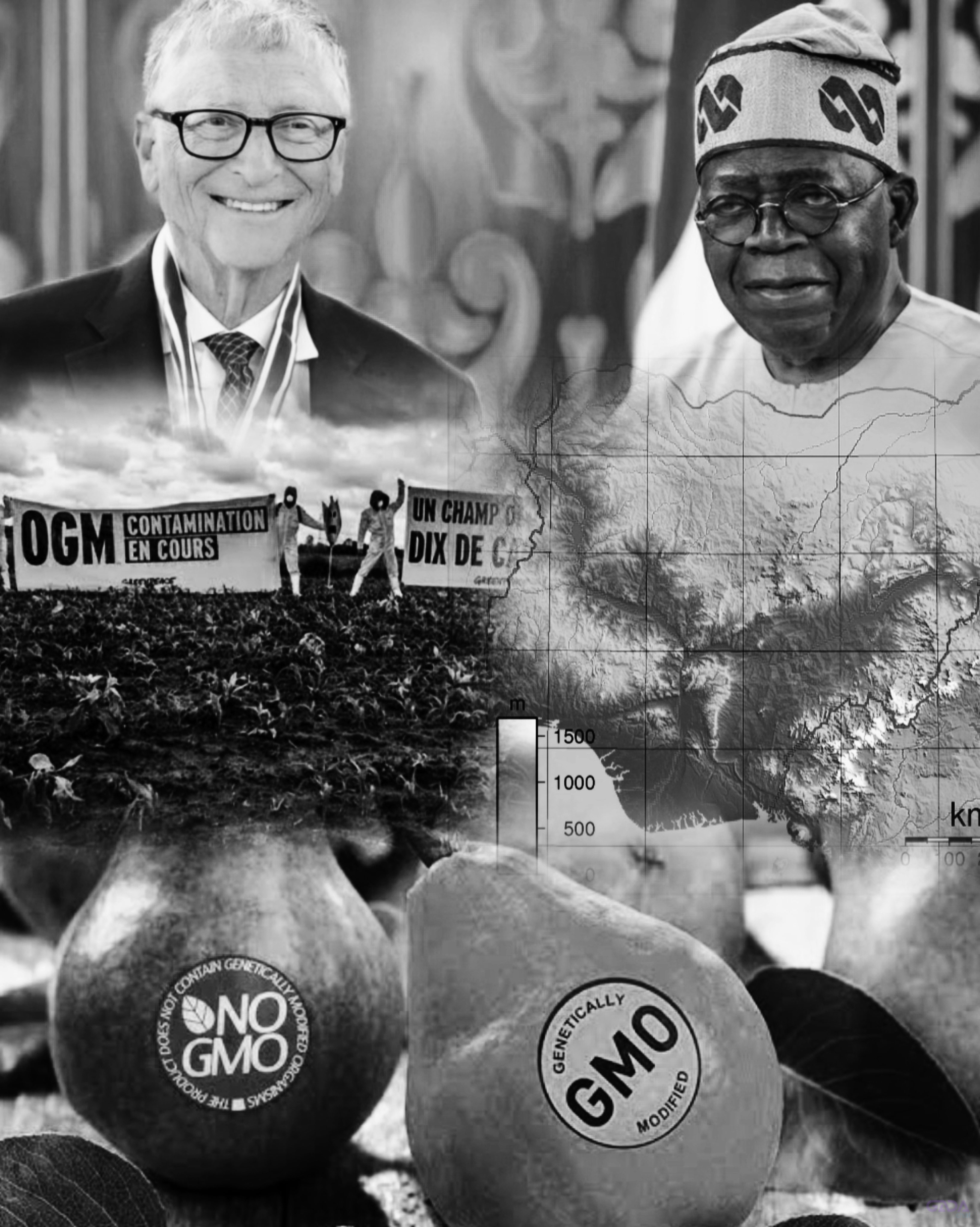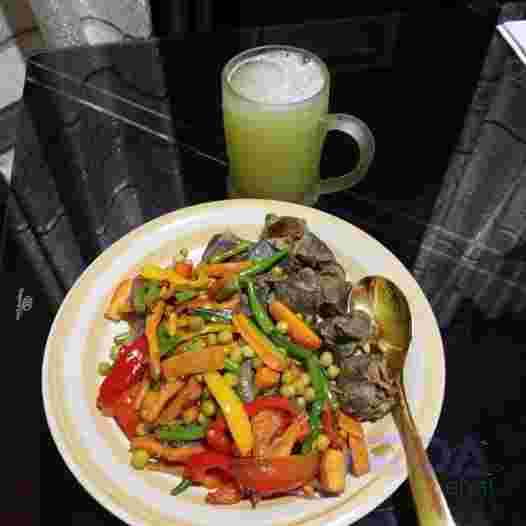*LET FOOD BE YOUR MEDICINE*
Most of the chronic diseases troubling Nigerians today didn’t come from our soil.
They came from our silence.
From the things we stopped eating.
From the foods we abandoned in our pursuit of status.
We had everything.
Bitterleaf and ogbono.
Acha, ofada, tigernuts, baobab, African oil bean, locust beans.
We fermented, roasted, sun-dried, and slow-cooked meals that healed the gut and kept the liver sharp.
But somehow, someone convinced us that the very foods that kept our ancestors alive were dirty, local, primitive, and “not balanced.”
And that’s where the problem began.
Walk into most homes in Lagos or Abuja today and ask a child, “What did you eat for breakfast?”
The common answers? Bread and tea. Cornflakes and milk. Chocolate-spread sandwich.
Pap, yam and oil, abacha, moi moi, or okpa have now been reduced to “village food.”
Yet these were the same meals that built strong teeth, fertile wombs, and clean arteries for generations.
So what really changed?
It wasn’t just colonialism, it was mental colonization.
The kind that continues today through food ads, Western medical policy templates, and shelves stacked with boxed and packaged meals.
And now we’re seeing the results:
confused diets, weak immunity, hormonal disruption, stunted metabolism, and chronic inflammation from childhood.
We’ve even changed how often we eat.
People now eat three to four times a day while moving less than 1,000 steps daily.
They wake, sit in traffic, sit at work, get home, sit again, and still believe they must eat something every few hours to “stay strong.”
Our ancestors walked to the stream, tilled the ground, fetched firewood, ground melon with stones, and trekked markets on foot.
Their meals were earned. Their digestion was natural. Their energy, clean.
Today, we mistake laziness for luxury.
We stop our children from sweating and call it love.
We buy them sugar-coated snacks, fast food, and flavoured drinks thinking it’s care.
Meanwhile, prediabetes, insulin resistance, and fatty liver are already developing quietly in many under-18s.
Open the average Nigerian fridge today.
Soda. Instant noodles. Sausages. Ice cream. Bread. Yoghurts with corn syrup. Chocolates.
All ultra-processed. All pro-inflammatory. All slowly damaging the brain, liver, and gut microbiome.
Professor Carlos Monteiro, from the University of São Paulo, coined the term ultra-processed foods in 2009.
He warned that these items are not merely unhealthy, they are industrially modified substances designed to be addictive and nutrient-empty.
And he was right.
In 2023, The British Medical Journal published a sweeping review of 45 meta-analyses covering 9 million participants.
The results?
Clear associations between ultra-processed food consumption and 32 major health problems, including cardiovascular disease, depression, type 2 diabetes, and premature death.
But in Nigeria, these same foods are branded as premium.
Imported equals superior.
Processed equals civilized.
And native equals backward.
Even worse, our policymakers follow the same logic.
Most African dietary guidelines are borrowed from the U.S. Food Pyramid or British medical templates.
We wait for WHO, CDC, or USDA to validate the food growing in our backyard.
We ignore the science our grandmothers lived by, science rooted in soil, in climate, in memory.
This is not just a public health issue.
It is a cultural amnesia.
The late Prof. Catherine Acholonu once said, “Our ancestors did not just eat to fill their stomachs they ate to align with nature.”
That’s not superstition.
That’s bio-adaptive nutrition.
That’s metabolic intelligence passed down across time.
And yet, we now look for imported keto kits, foreign wellness apps, and pharmaceutical supplements to solve problems that our food heritage already knows how to prevent.
Dr. Barry Popkin of the University of North Carolina described this global shift as the Nutrition Transition.
He divided it into five stages.
Africa, right now, is in Stage 4—marked by excessive sugar, seed oils, refined flour, and sedentary living.
What comes next is an epidemic of degenerative diseases.
So let’s be clear:
We’re not just eating wrong.
We’re thinking wrong.
You don’t eat what’s trending, you eat what your DNA understands.
You eat to reduce inflammation.
You eat to support your organs, not to stuff your fridge.
And when sickness finally knocks, the options are fewer.
That’s why prevention is no longer advice, it’s survival.
Self-care is no longer luxury, it’s a return to memory.
The healthiest food you can ever eat is the food your ancestors survived on.
It’s coded in your enzymes.
It’s aligned with your gut flora.
It’s built into your bones.
Eat with sense. Not with shame.
Protect your children from food confusion.
Let them grow up knowing that agidi is not lesser than croissant, and that ogi can nourish better than milk from a tin.
We don’t need another diet plan.
We need cultural clarity.
We don’t need to import everything.
We need to remember.
Because what kept us alive for 1,000 years is not backward,
…it’s what will save us now.
*LET FOOD BE YOUR MEDICINE*
Most of the chronic diseases troubling Nigerians today didn’t come from our soil.
They came from our silence.
From the things we stopped eating.
From the foods we abandoned in our pursuit of status.
We had everything.
Bitterleaf and ogbono.
Acha, ofada, tigernuts, baobab, African oil bean, locust beans.
We fermented, roasted, sun-dried, and slow-cooked meals that healed the gut and kept the liver sharp.
But somehow, someone convinced us that the very foods that kept our ancestors alive were dirty, local, primitive, and “not balanced.”
And that’s where the problem began.
Walk into most homes in Lagos or Abuja today and ask a child, “What did you eat for breakfast?”
The common answers? Bread and tea. Cornflakes and milk. Chocolate-spread sandwich.
Pap, yam and oil, abacha, moi moi, or okpa have now been reduced to “village food.”
Yet these were the same meals that built strong teeth, fertile wombs, and clean arteries for generations.
So what really changed?
It wasn’t just colonialism, it was mental colonization.
The kind that continues today through food ads, Western medical policy templates, and shelves stacked with boxed and packaged meals.
And now we’re seeing the results:
confused diets, weak immunity, hormonal disruption, stunted metabolism, and chronic inflammation from childhood.
We’ve even changed how often we eat.
People now eat three to four times a day while moving less than 1,000 steps daily.
They wake, sit in traffic, sit at work, get home, sit again, and still believe they must eat something every few hours to “stay strong.”
Our ancestors walked to the stream, tilled the ground, fetched firewood, ground melon with stones, and trekked markets on foot.
Their meals were earned. Their digestion was natural. Their energy, clean.
Today, we mistake laziness for luxury.
We stop our children from sweating and call it love.
We buy them sugar-coated snacks, fast food, and flavoured drinks thinking it’s care.
Meanwhile, prediabetes, insulin resistance, and fatty liver are already developing quietly in many under-18s.
Open the average Nigerian fridge today.
Soda. Instant noodles. Sausages. Ice cream. Bread. Yoghurts with corn syrup. Chocolates.
All ultra-processed. All pro-inflammatory. All slowly damaging the brain, liver, and gut microbiome.
Professor Carlos Monteiro, from the University of São Paulo, coined the term ultra-processed foods in 2009.
He warned that these items are not merely unhealthy, they are industrially modified substances designed to be addictive and nutrient-empty.
And he was right.
In 2023, The British Medical Journal published a sweeping review of 45 meta-analyses covering 9 million participants.
The results?
Clear associations between ultra-processed food consumption and 32 major health problems, including cardiovascular disease, depression, type 2 diabetes, and premature death.
But in Nigeria, these same foods are branded as premium.
Imported equals superior.
Processed equals civilized.
And native equals backward.
Even worse, our policymakers follow the same logic.
Most African dietary guidelines are borrowed from the U.S. Food Pyramid or British medical templates.
We wait for WHO, CDC, or USDA to validate the food growing in our backyard.
We ignore the science our grandmothers lived by, science rooted in soil, in climate, in memory.
This is not just a public health issue.
It is a cultural amnesia.
The late Prof. Catherine Acholonu once said, “Our ancestors did not just eat to fill their stomachs they ate to align with nature.”
That’s not superstition.
That’s bio-adaptive nutrition.
That’s metabolic intelligence passed down across time.
And yet, we now look for imported keto kits, foreign wellness apps, and pharmaceutical supplements to solve problems that our food heritage already knows how to prevent.
Dr. Barry Popkin of the University of North Carolina described this global shift as the Nutrition Transition.
He divided it into five stages.
Africa, right now, is in Stage 4—marked by excessive sugar, seed oils, refined flour, and sedentary living.
What comes next is an epidemic of degenerative diseases.
So let’s be clear:
We’re not just eating wrong.
We’re thinking wrong.
You don’t eat what’s trending, you eat what your DNA understands.
You eat to reduce inflammation.
You eat to support your organs, not to stuff your fridge.
And when sickness finally knocks, the options are fewer.
That’s why prevention is no longer advice, it’s survival.
Self-care is no longer luxury, it’s a return to memory.
The healthiest food you can ever eat is the food your ancestors survived on.
It’s coded in your enzymes.
It’s aligned with your gut flora.
It’s built into your bones.
Eat with sense. Not with shame.
Protect your children from food confusion.
Let them grow up knowing that agidi is not lesser than croissant, and that ogi can nourish better than milk from a tin.
We don’t need another diet plan.
We need cultural clarity.
We don’t need to import everything.
We need to remember.
Because what kept us alive for 1,000 years is not backward,
…it’s what will save us now.










